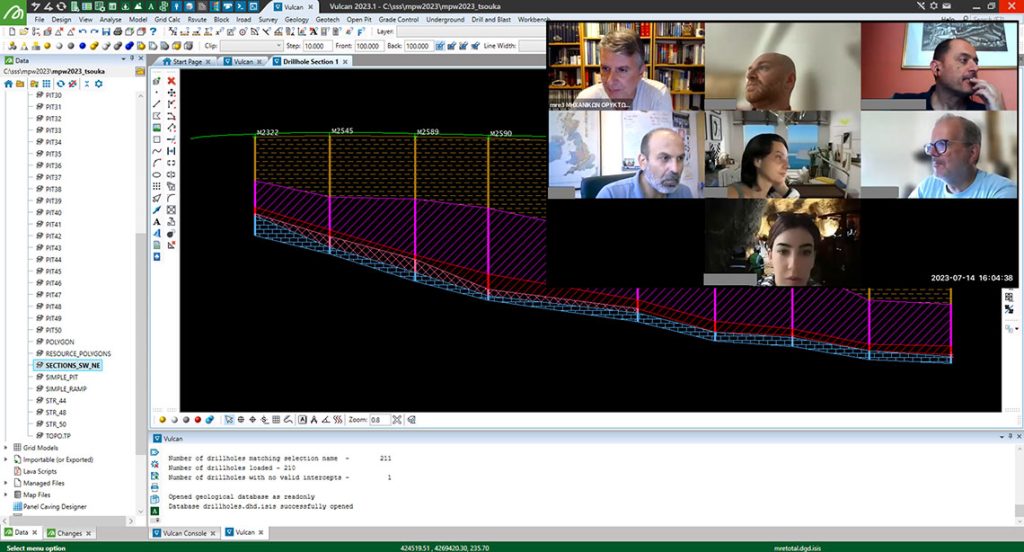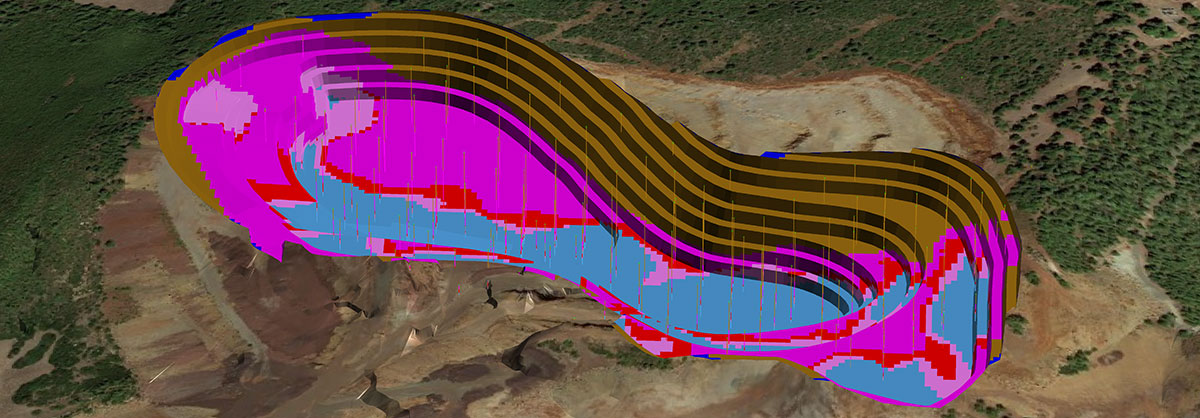September 2023 Issue Index
Train the trainers
A professional academic reflects on his long-held enthusiasm for Vulcan and drive to ensure new graduates are fully equipped to serve the mining industry.
In 1998, a keen PhD student at the University of Nottingham attended an introductory Maptek Vulcan training program. A few months later, Ioannis Kapageridis started in technical services at Maptek. That was the beginning of a long-lasting addiction to Vulcan!
Now an associate professor in Mining Informatics and head of the Department of Mineral Resources Engineering at the University of Western Macedonia, he considers the Maptek experience to have defined his professional profile.
Kapageridis recalled limited computing exposure during his undergraduate mining studies, with little content related to CAD or geological modelling applications. For his final year project in computer aided deposit modelling, he contacted mine planning software companies such as Maptek about their products.

‘The software and algorithm terminology was completely new to us, which meant that I had to improvise while writing my thesis,’ Kapageridis reflected.
The pace of technological change in the mining industry has escalated alongside the rapid uptake of new technologies. The academic community, which educates the people who will support the mining industry, must respond and adapt.
Systems for managing remote or autonomous operations have created new opportunities for people with special skills and knowledge.
‘More effort is needed to ensure that mining related courses in Greek universities keep pace with technology. The lack of reference material in Greek also remains an issue,’ Kapageridis said.
Expectations
While information and communication technologies are widely used in teaching and learning, this does not ensure that the actual course content matches the state of art in mining. Kapageridis noted the need to incorporate modern content as well as refreshing traditional subjects for engineers, geologists and other science specialties.
‘Robotics and autonomous systems, artificial intelligence, smart grids and electric drive systems are important subjects, but equally important is the modernisation of classical mining and geology modules,’ Kapageridis commented.
‘Geological mapping, mining exploration and geostatistics, surface and underground mining, mine planning and mineral processing education must incorporate the latest techniques.’
Students are requesting exposure to more advanced content and access to modern Greek textbooks on mining subjects. They prefer project-based learning, and since Vulcan is ideal for this purpose, Kapageridis set out to bring other academic staff on board with a dedicated mine planning workshop.
Train the trainers
Aware of the challenges of adding to the teaching load, Kapageridis scheduled the workshop outside of term time. The aim was to learn more than the Vulcan menu structure and which boxes to tick, focusing on modelling processes and how to teach them effectively.
Kapageridis observed that lack of in-depth knowledge of algorithms and modelling procedures, as well as limited familiarisation with specialised software are known barriers to integrating mine planning software in courses. Workloads can also hinder experimentation with new technologies and packages.
Another common academic misconception was that digital mine planning can be learnt in the workplace, with no need for this topic to be covered during studies.
Kapageridis said his observations working in Europe and Africa showed that better employment possibilities arise from having practical mine planning skills before entering the workforce.
‘With this workshop I wanted to encourage and inspire my colleagues – professors in resource geology, mine design and planning – to lead the way in undergraduate teaching,’ said Kapageridis.
Six academics from four universities in Greece and abroad, involved in teaching and research in mine planning and resource geology, were invited to attend. The 28-hour workshop was split into 4-hour sessions. Attendees were given access to Maptek Account licences and could participate remotely.
Kapageridis acknowledged that his program was probably over-ambitious but was pleased that attendees gained a good idea of how they could integrate Vulcan in their teaching workflow.
Collaboration and engagement were high – with the questions raised, issues reported and solved, and the results produced pointing to a highly successful workshop. Universally positive feedback was reflected from attendees.
‘The inexhaustible energy, patience, humour and willingness to solve any questions helped us to get a good taste of the capabilities of Vulcan and the other software tools.’
‘Before that, I had little experience in mine planning, but the workshop helped me understand design practices using Vulcan, which I look forward to applying in my work.’
‘I’d like to express my gratitude to our amazing instructor for his expert guidance and engaging teaching style. His passion for the subject was contagious, making the learning process informative and enjoyable.’
A second train the trainers workshop with more focused content is planned for next summer.
Hands-on learning
Maptek and the Laboratory of Mining Informatics and Machine Learning Applications share a long history going back to 1999. Maptek has provided software updates and support, undergraduate licence access, guidance during mine planning workshops and certificates for attendees.
‘Hands-on learning with an industry software package brings students closer to the issues and challenges that professionals face. A relatable real-world training dataset, such as the Greek laterite nickel deposit used, greatly helps the teaching and learning process,’ said Kapageridis.
Vulcan is an ideal platform for a mine planning course and the best means to reinforce theoretical knowledge and transfer skills.
The balance between theory and practice is very important, as is allowing adequate time between sessions for attendees to repeat some or all of the steps. Video recordings of lectures also help.
Futures
The benefits of an integrated learning approach can be measured easily. Exposure to actual industry tools rather than simplistic software packages results in confident students. Graduates then have better employment potential and make more effective employees.
Tailoring undergraduate curricula to be responsive to technological developments means companies will be able to select graduates with the necessary skills to analyse, plan, maintain and monitor mining operations. People with knowledge, familiarity with technology, and a culture of continuous improvement and adapting to change, are positive signs for the industry.
- Greek academics participated in a workshop designed to familiarise them with Vulcan mine planning software and modern algorithms to enhance their teaching repertoire
- Integrated learning that balances theory and practice is the most effective way to ensure the latest methods are incorporated in tertiary mine planning and design courses
- An undergraduate curriculum that is responsive to technological developments will create skilled graduates who are workforce-ready
About the trainer
Ioannis Kapageridis has been teaching undergraduate courses based on Vulcan for 22 years. His Laboratory can claim 30 Vulcan related publications in scientific journals and conferences, over 40 final year theses, a published textbook on mining informatics, and more than two decades of teaching geostatistics and mine planning to students.
‘Train the trainers’ enables instructors or subject matter experts to train others. Training is a process of acquiring knowledge, skills and attitudes needed to fill the gap between what people want to do, and what they are able to do now. A learning by doing approach is the best way to teach a trainer how to train well.

